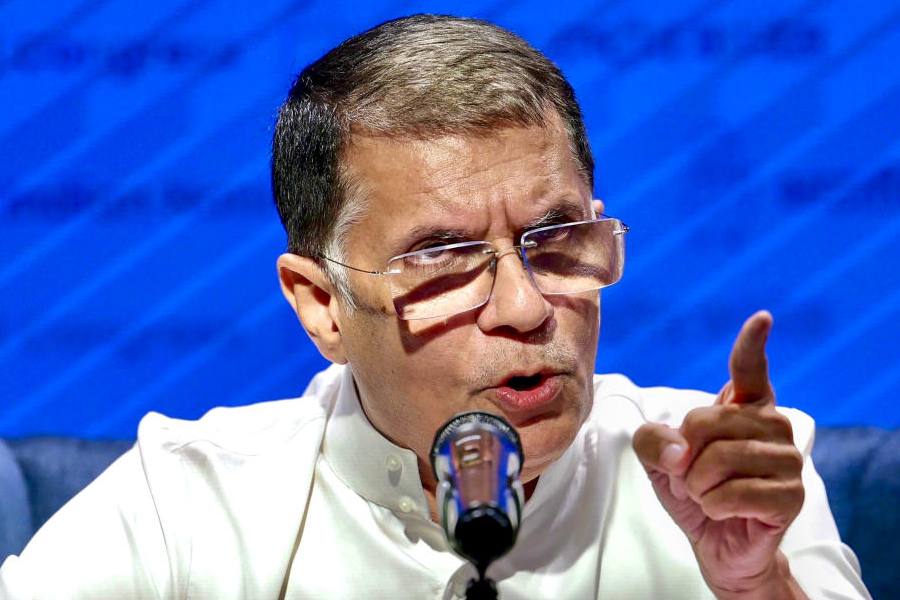|
|
Atal Bihari Vajpayee, the prospects of peace with Pakistan and the economic upturn this year seem to have made an unbeatable election-victory package. Given his age, it is unlikely that Vajpayee will continue to function as prime minister for all of the new five-year term. Voters seem to accept that a National Democratic Alliance-Bharatiya Janata Party government will function effectively under the many others in it and will take the country forward. What should be the agenda of any new government for the next five years in relation to the promises of peace and prosperity?
Achieving peace with Pakistan demands a permanent settlement on Kashmir, acceptable to all sides. It is perhaps the last chance for doing so. India will survive, as it has done, the tensions of a “hot” border. But without peace with India, the result ultimately will be a broken Pakistan with enormous problems for India.
India has had Pakistan as a major focus of foreign, external and domestic security policies. While it is doubtless unfair to brand the whole Muslim community as a Trojan horse for Pakistan, L.K. Advani was probably right in saying that a reason for communal flare-ups has been the distrust of Pakistan extending itself to Muslims as a whole. We need peace with Pakistan to help us revert to being a country in which different beliefs and faiths can live together in reasonable harmony. Communal harmony and a “peace dividend” will do wonders for nation building.
The larger bonus will accrue to south Asia if India and Pakistan could join in promoting the South Asian Free Trade Agreement. One example: south Asia has vast untapped hydroelectric potential in Nepal, Bhutan and India; gas reserves in Pakistan, Bangladesh and India; and enormous coal reserves in India. A united south Asia could have pipelines to import cheap oil and gas from central Asia and Iran, and in due course from south-east Asia. India has huge domestic demand for energy and over time, so will Pakistan and Bangladesh, that can be supplied from within the region and overland from Asia. Reforms have given south Asia among the fastest growth rates in the last decade, at 5.5 per cent. It is a huge and growing market, with a large youthful population of working age and with established learning skills. A prosperous SAFTA could rival China.
To reform our antiquated system of public governance we have to cut employment in government and introduce more specialist civil services. Transparency, wide consultation in all economic decision-making, freedom of information to citizens for inspecting any government documents, heavy penalties for corruption and “white-collar” crimes that include food and drug adulteration, insider- trading, taking and giving bribes, and so on, improvement in compensation to the bureaucracy and in institutions owned and controlled by the government (whether or not for profit) and making them performance-oriented are some items for this agenda.
Red-tape stifles initiative and performance. Our procedures and paperwork are largely pointless. They do not stop corruption and inefficiency. We must also eliminate pointless ministries and departments, and ensure that the remaining ones are well coordinated. Health, pharmaceuticals, water, sanitation affect each other and should be closely coordinated. So must power, petroleum and gas, coal, atomic energy, renewable energy and environment. There are others that should but do not.
The macro-economy has some major faults. The major ones are high deficits, below-cost user-charges for most services, subsidies to meet deficits caused by such charges that are poorly targeted and greatly misused, adding to costs. To improve the efficiency of the economy, disinvestment in state ownership must proceed rapidly at Central and state levels. It must now be extended to all nationalized banks, financial institutions and other enterprises, perhaps through open market offers. This must include electricity and parts of other infrastructure services.
Other macro-issues are decentralizing administration and the delegation of adequate financial powers to municipalities and panchayats. Central subsidies reflected in dual pricing should be replaced by less interventionist means like food, fertilizer, and kero- sene and electricity stamps to those entitled. Food stamps would replace the wasteful physical procurement, storage, handling, bogus cards, subsidy payments and food distribution. Dual pricing of kerosene has led to widespread adulteration with diesel. Fertilizer subsidies mostly go to the rich farmer. Uncapped and unmetered electricity subsidies have drained state electricity finances.
Parliamentary approval must be sought for taxes to be dedicated for specific purposes (like the Road Development Fund). The reluctance of the finance ministry bureaucracy to earmark and to carry funds forward results in poor cash-flows for projects, thus delaying their completion.
The budgeting system is antiquated and needs to move to a quarterly rolling budget system. Carryover of budgets must be allowed for a limited period. The budget should be resubmitted during the year to Parliament for reporting performance and enabling review.
Indian statistics are not as trustworthy as in simpler economic times. Agriculture and services growth figures are not based on reliable and regular field data. Small-scale industrial production is guesstimated with a census being conducted only once in five years. Even production estimates of the organized sector are perfunctory with different companies reporting in each period and some not giving all the required information. The Rangarajan Statistical Commission submitted a report years back. One of its recommendations was that statistics should be overseen by statisticians, not administrators, and be separated from the taint of political influence. It has not been, and must be, implemented.
The Securities and Exchange Board of India has become more independent. But it must be properly staffed, transparent, with strong penal powers, and regulate all savings instruments (for example, provident funds), and services like audit, management consultancy, and media commentators on financial matters. Oversight on all types of banks and financial institutions must be handed over to a body distinct from the Reserve Bank of India. Indian promoters have manipulated markets to earn premiums on fresh capital issues, and to buy at rigged cheap prices. They have badly hurt investors. An independent body (SEBI?), after public hearings (unlike the extinct controller of capital issues), must clear premiums on fresh issues.
Buybacks should not cheat the investor. De-listing must be accompanied with buyback by controlling shareholders at approved prices from small shareholders. Missing companies must be hounded along with their directors, auditors and merchant bankers. The dividend tax must go, interest on small savings more reflective of market rates, tax benefits on savings restored, and the tax-free limits on safe investments like relief bonds and post-office savings removed.
Independent regulation needs to be introduced in more areas to replace the opacity of government decision-making by transparency, openness and an opportunity to all concerned to be heard. The government should encourage competition and market determination of prices where it can, and where unavoidable, hand over decision-making powers to independent regulators working in a transparent manner, for example, in healthcare, coal and gas. Other remunerative decisions should be taken in public hearings, for example, anti-dumping, company affairs. Full computerization of tax-collections has been the aim for ten years and is still to be completed. Resistance from tax-collectors who may see vanishing opportunities for additional incomes may be a cause for the lethargic progress.
Huge state-government liabilities to the Centre have been compounded in the mini-budget of 2004 but we need a permanent solution. More sources of income must be delegated to the states. We must achieve countrywide uniformity in sales taxation, eliminate octroi and entry taxes, enable easy inter-state movement of goods, and simplify procedures for matters ranging from land- acquisition to new investments.
If the theme of the new government is peace and prosperity, it must demonstrate a will to achieve them.











